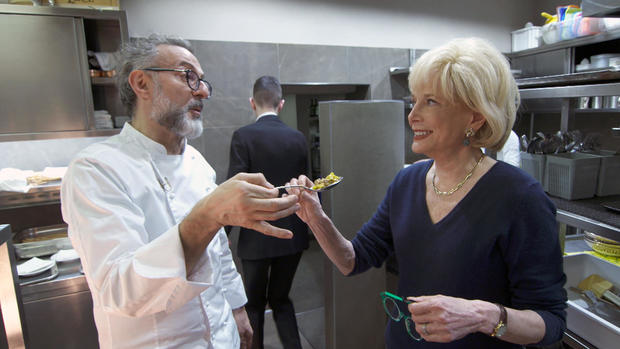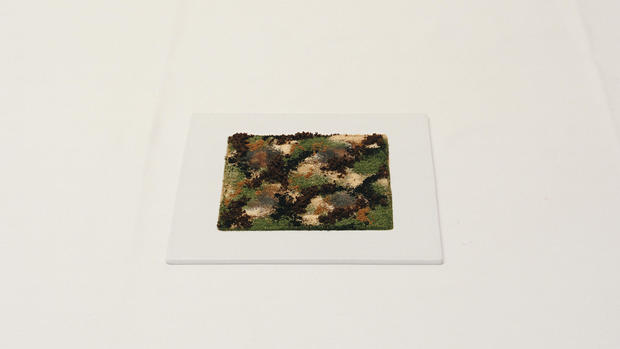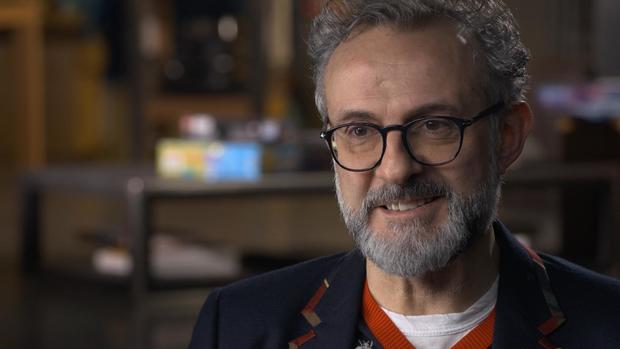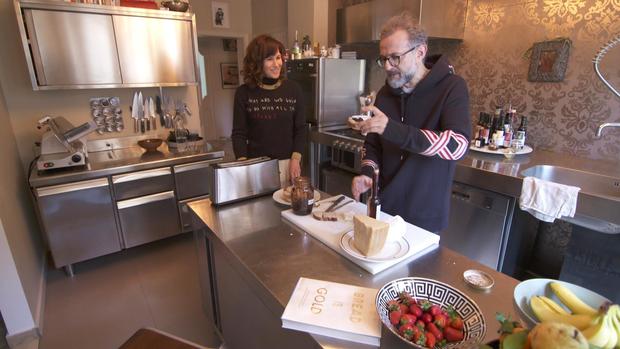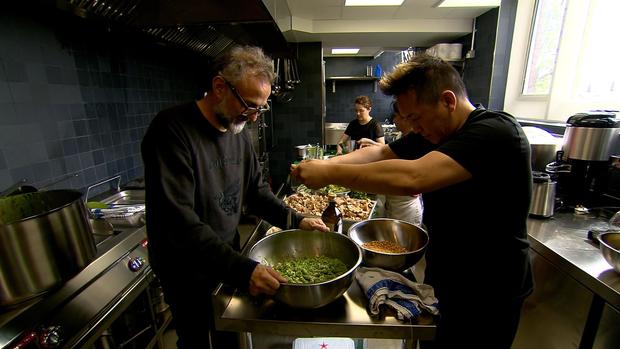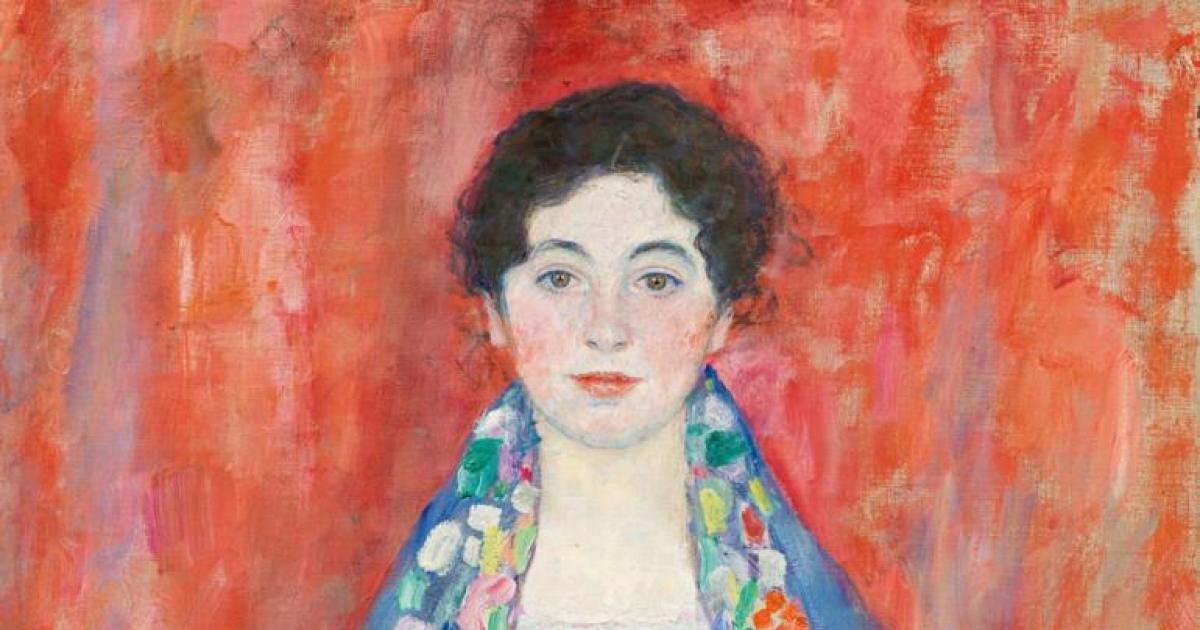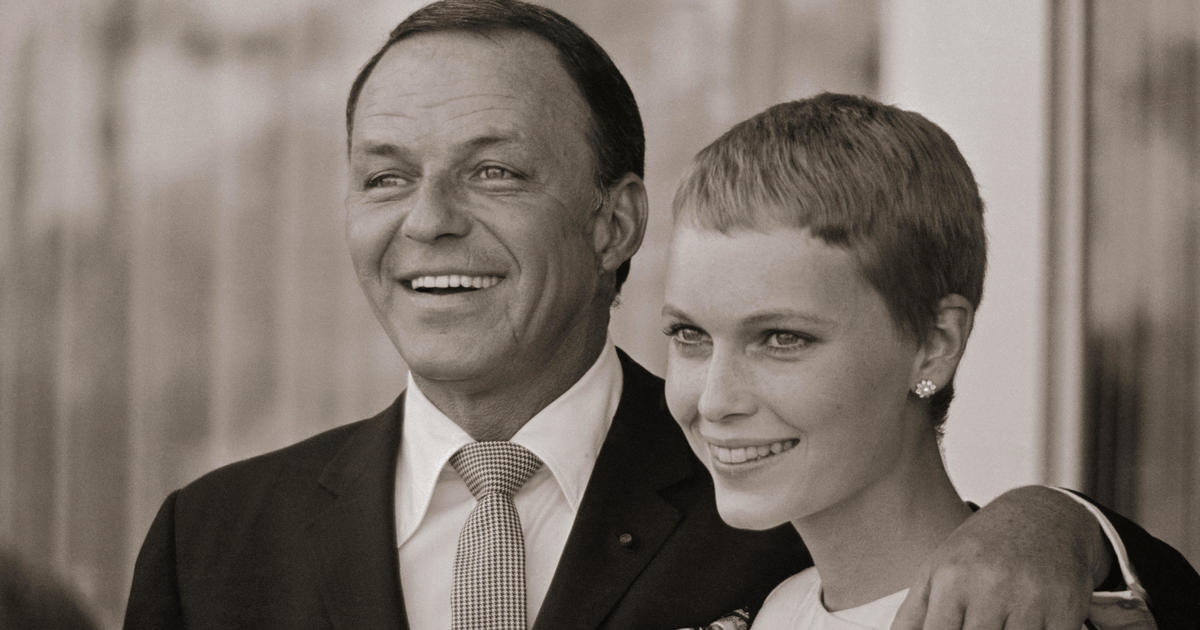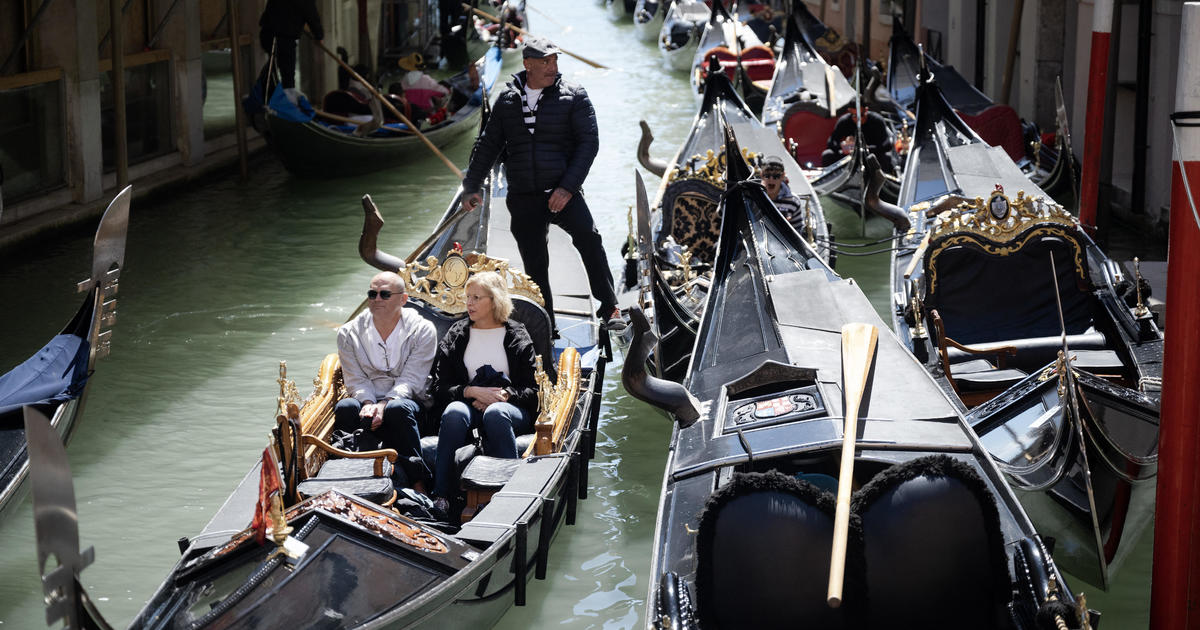Chef Massimo Bottura: The Pavarotti of pasta
Today, when chefs can be as famous as movie stars and their creations in the kitchen as admired as original works of art, there are few who rival the success and celebrity of Massimo Bottura.
His restaurant, Osteria Francescana has three Michelin stars and, as we first reported last year, it ranked number one on the list of "The World's 50 Best Restaurants."
It's located in Northern Italy in a city called Modena, where the great tenor, Luciano Pavarotti, was born. When we went to Modena to meet Chef Bottura, we were struck by how operatic he is.
Massimo Bottura: Imagine, imagine, imagine, dream. You have to dream about food, okay? So--
Lesley Stahl: Do you dream about food?
Massimo Bottura: I always dream about food. I always dream.
We first met Massimo Bottura shopping for food in Modena, the home of Italy's finest balsamic vinegar and parmesan cheese. He buys the freshest vegetables like green tomatoes that he likes to top off with 25-year-old balsamic vinegar.
Massimo Bottura: (LAUGH) Are you ready?
Lesley Stahl: I can't wait.
Massimo Bottura: Okay. It's an experience that is gonna stay with you for the rest of your life. I'm telling you that.
Lesley Stahl: This is a huge moment Massimo.
Massimo Bottura: Yeah, it's a huge moment for you.
Lesley Stahl: The whole thing, just like that?
Massimo Bottura: Just one bite.
(Stahl puts tomato in her mouth)
Massimo Bottura: And close your eyes, connect your mental palate and understand. Your perception, your receptors are talking to you right now.
Lesley Stahl: There are so many different things going on in my mouth. I can't believe it.
Massimo Bottura: Yeah, it is. It is. It is. Complexity.
And that's his signature as a chef.
Lesley Stahl: And what's he making?
Massimo Bottura: He's making risotto, toasting rice, with, look, orange juice.
Dishes that are complex mixtures of unexpected flavors.
In his kitchen at Osteria Francescana, he oversees a staff of 35 as they build his beautiful, avant-garde masterpieces – that he says are inspired by contemporary art. His creations are like canvasses.
And he christens them: he calls this "Camouflage" - made of wild hare, juniper berries and cocoa powder.
Lesley Stahl: Oh, that's spectacular.
Some of his dishes are beautiful, some are whimsical -- and then there's his version of popular Italian cuisine.
Lesley Stahl: That's chicken cacciatore?
Massimo Bottura: So, this is chicken cacciatore.
Lesley Stahl: Oh my god.
You wouldn't recognize most of his Italian dishes…
This is "The Crunchy Part of Lasagna"
Massimo Bottura: Spaghetti with tomato, spaghetti with parmigiana, spaghetti with fresh herbs.
Bottura is one of the most successful chefs in the so-called deconstruction school, where food is presented like abstract art.
Lesley Stahl: What do you call this dish?
Massimo Bottura: Uh, I don't know..
His culinary creations are rooted in the traditions of Northern Italy and his hometown, Modena, an ancient city of narrow streets and grand piazzas - where they've been making parmesan cheese and balsamic vinegar the same way for centuries.
It's where Bottura's love of food began, when he was just a little boy, hiding under the kitchen table.
Massimo Bottura: I remember my grandmother was rolling pasta. In the meantime, what I was doing I was stealing the tortellini from-- from under the table and eat the raw tortellini.
Lesley Stahl: That's how you were beginning to develop your palate was from--
Massimo Bottura: I think so.
Lesley Stahl: --raw tortellini.
Massimo Bottura: Yeah. From a raw tortellini (OVERTALK) you can understand a lot. (CHUCKLE) You can understand the amount of spices they use, the amount of parmigiano, the amount of ham, you know, those kind of things.
Lesley Stahl: Even as a little kid.
Massimo Bottura: Balance. Balance.
Lesley Stahl: How old are you at that point? You're a kid.
Massimo Bottura: Yeah, like seven, six.
Lesley Stahl: And you're falling in love with food.
Massimo Bottura: In that moment.
Lesley Stahl: Yeah.
Massimo Bottura: Exactly.
He started cooking for his friends when he was in high school, but his father wanted him to become a lawyer in the family's lucrative fuel business.
Massimo Bottura: I have to show my dad he was wrong. Because he tried to convince me not to get into that business.
Lesley Stahl: Of being a chef.
Massimo Bottura: Yeah.
Lesley Stahl: He didn't respect that as a serious profession.
Massimo Bottura: He didn't, no. No, no, no. No, no, he didn't.
Lesley Stahl: No more money from daddy.
Massimo Bottura: Nope.
Lesley Stahl: That was it.
Massimo Bottura: No, no. That was it.
Lesley Stahl: Cut you off. And you're saying to yourself, "I have to show you."
Massimo Bottura: I don't want to say-- "Revenge" is a very strong word. It's more like-
Lesley Stahl: Show he-- show that you were right.
Massimo Bottura: Show that I was right.
But he wasn't right, right away. When he and his American wife Lara Gilmore opened Osteria Francescana in 1995, amidst all that tradition in Modena, they were offering Bottura's minimalist rendition of a bowl of tortellini, just six little pieces of pasta.
Lesley Stahl: So six little, tiny-- and that was it.
Lara Gilmore: So, the biggest provocation of all.
Lesley Stahl: Yeah. (CHUCKLE)
Lara Gilmore: A tortellini is something, it's comfort food for-- for Modenese. It's like a religion. If you don't believe in God, you believe in tortellini. But you don't want six. You want a nice, big abundant bowl of tortellini with the hot broth. And he was serving this sort of warm, room-temperature broth gel and the tortellini were there. There were six of them. And the Modenese were, like, putting their hands, like, "What did I come here for?! (LAUGHTER) Why am I here?"
Food critics asked themselves the same question.
Massimo Bottura: A very important Modenese food critic came and he--
Lara Gilmore: THE Modenese food critic.
Massimo Bottura: --and he-- "the" Modenese food critic-- (LAUGHTER) came and eat at our restaurant. Like the-- (CHUCKLE) the--
Lesley Stahl: Oh god. (LAUGHTER)
Lara Gilmore: Of course the review was terrible. (OVERTALK)
Massimo Bottura: The review was like (OVERTALK) "Please don't go there."
Lesley Stahl: Oh!
Massimo Bottura: "Don't go there."
And hardly anyone did. His food was seen as a sacrilege in a country that reveres mothers and their home-cooking.
Lesley Stahl: Did you ever say to yourself, "OK I'm going right back to the old Italian cooking? I can do it. I know how to do it."
Massimo Bottura: Never.
Lesley Stahl: Never?
Massimo Bottura: No, you can't do that.
But after six years of bad reviews and empty tables,
He gave in and introduced a handful of traditional Italian dishes, including an old-fashioned tagliatelle. And then a prominent national-food critic happened by, ordered the tagliatelle and wrote--
Massimo Bottura: These are the best tagliatelle in the world.
Lesley Stahl: He said that.
Lara Gilmore: Yes.
Lesley Stahl: So that turned everything around.
Massimo Bottura: Totally.
Lesley Stahl: You are known as the maestro.
Massimo Bottura: Now. Before, they want to crucify me in the main piazza. (CHUCKLE) Now they call me maestro. That's the difference.
Some of the maestro's dishes are improvisations born out of accidents, like his "Oops! I Dropped the Lemon Tart."
Massimo Bottura: That's a classic. (LAUGHTER)
The story begins when his pastry chef, Taka, was making a lemon tart.
Massimo Bottura: I saw Taka completely white. He drop one of the two tart in the plate, upside down, just like that.
Lesley Stahl: Oh, god.
Massimo Bottura: Taka was like ready to kill himself. And-- and-- I said, "Taka! Taka, no! Please, no."
Lesley Stahl: "Don't kill yourself."
Massimo Bottura: "Don't, don't. (CHUCKLE) Look at that. That lemon tart is so beautiful that we have to serve the second one exactly the first one." We did it. We rebuilt, in a perfect way, the imperfection. We (SLAP) smashed the other tart exactly as the first one. (CHUCKLE) I can't believe-- I can't believe we did that. If I think now, I-- like, we were crazy. (CHUCKLE) I was like totally out of mind.
"Oops I Dropped the Lemon Tart" is Jackson Pollack on a plate. And it's one of the most popular dishes on a tasting menu of 12 courses that, with wine, can cost more than $500 a person.
They serve lunch and dinner five days a week and it's always booked. Reservations open three months in advance, and fill up in minutes.
Massimo Bottura: Are you prepare for the best salad of your life?
He invited us to sample some of his other signature dishes in his well-stocked wine cellar.
Massimo Bottura: Caesar Salad in bloom.
Lesley Stahl: Those are flowers.
Massimo Bottura: All flowers, edible flowers.
Lesley Stahl: All edible flowers?
Massimo Bottura: 27 elements in that dish.
It takes two chefs to build the salad leaf by leaf, petal by petal. And for this dish it takes a splash of seawater.
Massimo Bottura: This is seawater transformed into paper.
Lesley Stahl: You make paper out of seawater?
Massimo Bottura: Yes.
It may not look like it, but this is Bottura's filet of sole, topped off with wisps of dehydrated seawater. He calls it "Mediterranean Combustion."
Lesley Stahl: How am I ever going to eat normal food again, ever?
Massimo Bottura: But you feel how light you feel.
Lesley Stahl: Very light. But totally delicious. How long did it take you to create this one dish? Was it months? Was it --?
Massimo Bottura: 32 years.
Lesley Stahl: Come on.
Massimo Bottura: 32 years of experience.
Now 56, after all his hard work, Bottura is riding high: sometimes on his customized Ducati motorcycle.
But a few years ago he began to feel something was missing in his life: that serving fancy food to international foodies wasn't enough.
So, like other celebrity chefs, he began to think about helping the poor, by feeding them.
Lara Gilmore: This is late 2013. We had just sort of-- one year into having our 3rd Michelin star. We had worked 20 years to get. And I'm thinking, "Now you want to start doing this?" I thought it was a terrible idea.
But, she relented and helped him open a number of what he calls refettorios – kind of souped up soup kitchens. But he didn't want them to feel like down-and-out, stand-in-line cafeterias.
So, partnering with local charities, he created warm, inviting dining rooms in old abandoned theaters or unused space in churches where the working poor and homeless Italians and refugees from Africa sit side-by-side with volunteers who serve them three-course meals like in high-quality restaurants.
The food, donated by local grocery stores, would've been thrown out because it's slightly-damaged or near its sell-by date.
He's opened six refettorios so far: in London, Paris, Rio de Janeiro and three in Italy, with more to come.
Lesley Stahl: Where did that inspiration come from?
Massimo Bottura: The numbers are math. Numbers: 33% of the world production are wasted every year. 1.3 billion tons of food is wasted every year. You know, think about one trillion of apples goes in the gab-- garbage. Think about how many, you know, apple pie you could create with those trillions of, you know. That's insane!
The man who has, for decades, insisted on the oldest balsamic, the finest parmigiano, the freshest tomatoes now realizes there's salvation in discarded leftovers. If cooked well they can nourish the poor, as he says: by filling their stomachs and lifting their spirits.
And his as well.
Massimo Bottura: It's absolutely necessary to give back some of the lucky life you're living. So this is about giving back. It's what we need. We need dreams. If you don't dream and you don't dream big, you know, you cannot change the world.
In May, Chef Bottura auctioned off a 49-year old bottle of scotch whiskey for $140,000. The proceeds will go toward his fight against hunger and food waste, a cause that Time Magazine cited when it named Bottura one of the 100 most influential people of 2019.
Produced by Rich Bonin and Sabina Castelfranco. Associate producer, Ayesha Siddiqi.
